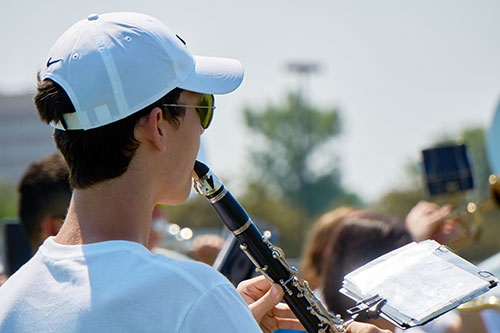
A key part of music contests is developing healthy relationships with the judging community. These relationships are important to the growth of your group and can sometimes be challenging and frustrating.
No one wants rocky relationships, but that happens more frequently than we would like. If there is tension between judges and staffs, nobody is at their best and the free flow of information slows to a dribble. This is unfortunate and avoidable. At its best, interaction with the judging community is symbiotic. The possibilities for meaningful collaboration between judges and staffs are significant and central to student growth. That, and not the competitive result, should be the bottom line. When it isn’t, problems — occasionally major — occur. Ego has ruined more than a few opportunities for teaching and learning.
I grew up in competitive drum corps in the mid-1960s and have taught it since the early 1970s. Many great professional relationships, but more than a few frustrations, have come from this experience. In the late 1970s and ’80s, Drum Corps International was like the Wild West for teachers and judges. There were such visionary judges as Bernard Baggs, Don Angelica, George Olivierio and Shirlee Whitcomb, but also those of another stripe. I recall one judge railing at my group’s performance, and then adding, "but everybody on the East Coast sounds terrible this year." This was a prominent judge, but one who had limited teaching and no writing experience. Two of the top three DCI finalists that year came from the East.
John Phillips, then a young brass judge, was a much-needed mentor. Once, a constructive critique led a few days later to two unsolicited pages of suggestions from John. He was invested; he wanted my group to improve. Things later improved in DCI, and John remains an essential part of that. When I entered public education, this approach was vital for my staff and the progress of our groups. The judges and those judged are in this together.
Here are some things to remember as you approach your next season of judge interactions:
- You can choose to make the judging community be an extension of your educational faculty. If you believe this, your staff must share that belief. Hold them accountable for approaching things in that way. If they want to vent about a judge, let them vent to you.
- Judges want you to succeed. No judge wants groups to look or sound bad. Most of us have walked in your shoes. We are pulling for you.
- When judges offer ideas and suggestions, you have to momentarily suspend ownership and ego, and accept what is said objectively. This is particularly true for designers. It can feel like someone is calling your spouse or child ugly. It is helpful to think, "Maybe this isn’t as good as I thought it is. How can we make it better?" Then ask for help.
- Avoid the trap of thinking that "The judges are trying to rewrite our show." Usually, this is not the case. Sometimes it may be that your design intent is not clear. You can point out politely what the judge has missed. As a judge, I love having that conversation because I learn more about the show and can help the staff define how to clarify the designers’ intent through the performance. The best approach is to say, "The next time I’d like you to notice…." Or, "We need you to credit…."
- Do not disparage a judge to your students. Many of us grew up with directors who said, "The judges hate us" or "We’ll do better with out-of-state judges." This doesn’t explain an outcome or encourage the students. Instead, they end up thinking the system is rigged, which it isn’t.
- Occasionally, judges make errors. If you must address this with the group, say, "I don’t agree with how this judge saw things, but let’s see what we can learn." Then, make your case to the judge administrator in a calm, factual way. This is a teaching moment for your students, and a good judge administrator will help you negotiate these rough seas.
- The staffs that listen most closely and act on that input get the most information from the panels and ultimately come closest to their group’s potential. There is nothing more frustrating for a judge than to give good information and suggestions to staff and discover later that they have not implemented any of them. When I first started judging marching band, a director came into the critique and announced, "I am not going to change anything." So, a deeply flawed design was left unfixed. I felt bad for his students.
- Make sure your show has pacing and transitions that you can defend. Those areas tend to be groups’ greatest weaknesses and are hard to fix in the short fall season.
- Do not discuss or disparage other groups in critique. Word will get back to those groups, and judges will lose respect for you.
- Take critiques seriously. It is disheartening to have staff from a band that has performed early in the show come into critique without having listened to the judge audio files. There is usually no good excuse for this, and it’s not very respectful.
- Be the model for your staff and students. Competition is unhealthy only if you let it be.
- Consider sending out a libretto that lists staff and a brief description of your program. If you can, include links to the source material. Judges who are invested will do their summer listening for two reasons: to better serve the bands and to become more musically literate. We are lifelong learners.
- Be patient with inexperienced judges. Some may be evaluating you for years. You can help them improve or make them an enemy.
- Be self-critical about why effects aren’t working. The idea in your head may be great, but does it translate? The rise in narrative shows has been a good development in the marching arts but creates problems if the idea is too abstract. Seek judges’ help in making the intent clear. What is clear to you isn’t always clear to us.
I recently did an in-service with one of the more creative staffs with which I deal. They had a clear narrative with a coherent story. The titles of the tunes furthered the narrative. However, somehow the intent was murky and didn’t articulate what the staff intended. Further study revealed that the lyrics told the story but weren’t reflected in the music the staff chose. (The band didn’t use voice patches.) That band would have been better served with music that had nothing to do with the narrative but reflected the moods of the show. Sometimes what looks great on paper is ineffective in practice. We discovered that in a post-season post-mortem, which leads to this next point.
- Think beyond the season. Judge relationships don’t have to end with the finals. When I was brass caption head of the Boston Crusaders, I asked the chief brass judge’s permission to send a short survey to selected judges, that asked for their perceptions of our weaknesses and strengths and suggestions for the future. We got information that shaped our winter’s approach, and the next year the group improved exponentially.
- Ask a judge you respect to do an off-season in-service with your staff.
The reward of judging is much more than the paycheck; it comes from the joy of helping staffs and groups develop. There are many groups with talented, creative staffs that just need a gentle guiding hand. Staff, it is up to you to be open and come with your ego checked at the door. Judges, it is up to us to always be willing to be patient mentors. We are all part of a continuum.






